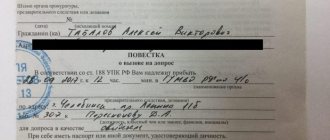The defining moment of any interrogation is the behavior of the person being interrogated. It doesn’t matter in what status you are participating in the interrogation - they accuse you or are simply waiting for an explanation of the case - you need to behave equally calmly and confidently. The task of the Investigative Committee employees is to bring the citizen to confession. Your task is not to harm yourself in any way.
To avoid becoming a victim of provocation or psychological pressure, enlist the support of a lawyer. This is the main rule - never come to interrogation without your lawyer.
Only a lawyer will be able to impartially assess the situation, find the right approach and develop the optimal behavior strategy for you.
Do you want to figure it out, but don’t have time to read the article? Lawyers will help
Entrust the task to professionals. Lawyers will complete the order at the cost you specify
27 lawyers on RTIGER.com can help with this issue
Solve the issue >
When can they be summoned for questioning by the Investigative Committee?
The Investigative Committee is summoned to testify. This can happen in several cases.
Conducting an inspection - a criminal case has not yet been initiated, but information on the received statement of crime is being verified.
How does this happen
The investigator calls for explanations.
This is not yet an interrogation, and attendance is not strictly required. But it is better not to ignore this meeting, but to prepare and give the most necessary information. You can also include the evidence base. Perhaps this will all end. Interrogation - carried out when a criminal case has already been initiated. That is, an inspection was carried out and signs of a crime were identified. This means that everything is already very serious.
How does this happen
They are summoned for questioning by subpoena, but they can call and set a date and time to appear.
The most reasonable thing is to give your consent and come, always with a lawyer. Otherwise, they can come home, to work and take you to the investigator. In this case, there will be no time either to call a lawyer or to prepare for the conversation. What needs to be clarified in any case: who is being called in for questioning - a witness or a suspect. Each of them has their own rights.
For example, a suspect is required by law to have a lawyer, but a witness is not required to have one. A suspect may refuse to testify in the absence of a lawyer, but a witness does not have the right to do so.
Just because you've been called as a witness doesn't mean you can relax. The status can be changed to suspect if during the interrogation the investigator sees signs of a crime in the actions of the witness. And a witness has much less rights than a suspect.
Often, investigators call a person as a witness, conduct an interrogation, as a result of which he becomes a suspect.
If you are summoned for questioning, contact a lawyer immediately.
Legal assistance from a lawyer when summoned for questioning
Law Firm "Legal Guarantee" has been providing defense in criminal cases of any complexity since 2003:
- We provide professional consultations: both in person and by telephone - 7 days a week;
- We represent the interests of witnesses and victims;
- We provide legal assistance during surveys and interrogations.
The experience of our lawyers ranges from 5 to 20 years.
Your case will be handled not by yesterday’s student, but by a qualified specialist who observes professional ethics and attorney-client privilege.
You can be assured of the confidentiality of all information that has become known to your lawyer from you.
Let's summarize.
How to prepare for interrogation
So, you have found out your status. If the investigator calls by phone, then you need to get as much information as possible: who is calling, last name, first name, patronymic, position, where you are being called, on what issue, what specifically interests the investigator. Sometimes a talkative investigator can provide the necessary information, and for a lawyer this is useful information.
Assess the reliability of the counterparty and reduce commercial and tax risks
A summons for questioning is a reason to immediately contact a lawyer. Not 15 minutes before the interrogation, but at least a day before. During this time you need to carefully prepare:
- It is best to think through your position in writing. Remember all the nuances: dates, names, place, deadlines, etc. You can use recordings during interrogation; this is permitted.
- View documents related to the case: contracts, acts, bank account statements, etc.
- Analyze declarations of accrued taxes, the fact of payment, in case of late payment - the reasons that led to this.
- If the matter concerns non-payment of wages, identify the reasons that led to this. It is possible to prepare a plan in advance and voice it during interrogation.
- Go through all possible options for the development of further events and try to find a way out. Adhere to the same position (thought out in advance) during interrogation.
What is the difference between a victim and a witness in a criminal trial?
A victim is a citizen who, in fact, received property, financial or physical damage as a result of an offense. If he died, then his relatives speak for him.
Reference. He receives his status by decision of the investigation or court.
In the science of criminal law, it is considered as an animate object of a crime, which was influenced by other persons, which led to negative consequences for it.
In criminal proceedings, he acts as the prosecution party, whose interests and rights have been damaged. He is endowed with certain rights and responsibilities, which we will discuss below.
Unlike the victim, a witness is defined as a person who knows any information regarding the case that is important for determining its circumstances. His summons and interrogation take place in the manner established by the Code of Criminal Procedure of the Russian Federation.
The significance of the victim's testimony
According to Part 1 of Art. 78 of the Code of Criminal Procedure of the Russian Federation, the testimony of the victim is the data obtained by the investigator during the investigation or judicial proceedings according to the requirements established by the legislation of the Russian Federation.
Features of the victim's testimony include:
- the data was obtained from a person recognized by the investigation as a victim;
- the information is vital to the investigation;
- information is presented orally;
- they were recorded during the interrogation;
- the data were reflected in the protocol.
Undoubtedly, the information received from a person is extremely important for the investigation, but it can be subjective, since the victim is a victim of an offense, and therefore may not always objectively perceive what happened or does it through the prism of his emotional state at that time.
From the point of view of the law, the testimony of the victim is also a means of proof, so providing it is not only a right, but also an obligation on the part of the citizen. Like a witness, he is not obliged to give them against himself or his loved ones.
Important! The citizen’s testimony contains not only facts and information about the case, but also his assessment of these events.
How to behave during interrogation
It is important to be attentive, speak to the point and in moderation, and remain calm.
Don't say too much or unnecessary things. The interrogation is about a specific case, answer about it. Don't talk about other events or people. This information can be used against you.
For example, the investigator may gain confidence, and during the conversation the witness will begin to say that he has an apartment in Italy. Later, if the status of the witness changes to a suspect, the court declares the presence of housing abroad and the possibility of hiding, the issue of detention during the investigation will be decided. If the investigator had not received information about foreign real estate, he would not have even thought in this direction.
Everything you say will be used against you. Be careful. If you don't remember something, say so. If you don’t like the question or you need to prepare to answer it, say that you find it difficult to answer because you need time to remember the circumstances.
Check the interrogation protocol. You need to check the time, place, date of compilation, and the facts presented. Read the text carefully, check whether the wording matches the meaning of what was written. If the investigator refuses to change them, then in the “comments” column you should write what you do not agree with. We put dashes in the empty spaces so that nothing is added or printed there. Do not sign the interrogation report without reading it.
Try to make a copy of the interrogation protocol. If there is such an opportunity, do not neglect it.
Useful articles
How an entrepreneur can prepare for interrogation
Tricks of tax authorities during interrogations
“You know why you were taken”...
The situation when a “stout” man in a leather jacket comes to your office and asks you to “walk” with him in an unknown direction, you must admit, is extremely exciting and unpleasant. Even if the same individual entrepreneur with an annual turnover of no more than one million rubles did not commit anything illegal, regularly contributed money to the funds for one single employee, and also honestly bore the burden of “simplified”, he will still have a problem in his head. many questions: “Why me”? "For what"? “What do they want from me?” The effect of surprise and the state of uncertainty aggravate the emotional component of this moment, and at this stage many people begin to experience jitters. In general, this is what the investigator was trying to achieve when he “accidentally” visited our individual entrepreneur. What happens next? And then everything is “according to Stanislavsky”: an office, a table, chairs, a thick folder “Case” and the feeling that the investigator here is the master of the situation. If a representative of law enforcement agencies has real suspicions about an entrepreneur, or he may be a defendant in some other case, then the investigator will begin to ask him questions, but first he will make one more curtsey towards the suspect. It sounds something like this: “So, Pal Palych, will you tell me yourself or will we extract testimony? Just think about it... Think well”... At this moment the investigator leaves the office, leaving our hero in alien territory with a bunch of questions that are disparate in their content. It is precisely the state of confusion, fear and uncertainty that will become a solid opportunity for the detective to find out the necessary information. In this case, we recommend that everyone understand one important rule - you must remain as firm as a rock, answer only “Yes” or “No” to closed questions, and try to avoid open questions. Remember that Russian legislation requires interrogation to be conducted without interruption for no more than 4 hours in a row and no more than 8 hours during the day. The investigator himself will get tired of torturing you.
What surprises can you encounter during interrogation?
No matter how much you prepare for this procedure, it will be stressful for you. During the interrogation, no one will stand on ceremony with you; you may hear profanity and harsh criticism of your actions.
You will be asked uncomfortable questions and interpret the answers differently in order to influence your emotional state. Emotionally, you can start making excuses and say unnecessary things. Therefore, it is important not only to control your behavior, but also to keep a lawyer with you. His job is to protect the client and smooth out rough edges.
Seizure of a phone, tablet and other equipment that will be available. Clean up unnecessary, controversial, ambiguous information in advance. This also applies to laptops, mail, and cloud services.
If necessary, what has been erased can be restored. Think about it. If you have not thought through these actions, it is better to give your phone or tablet to a lawyer before interrogation; they cannot seize anything from him, they have no right.
Appointment of examination. This could be a handwriting examination. You will need to provide handwriting samples, signatures, write 10 sheets of text, and also put your signature on five sheets.
Using a polygraph. Remember that the specifics of such research exclude violent and coercive use.
Search your home or work. This may happen at inconvenient times, such as early in the morning or late in the evening.
They can handcuff you and detain you for 48 hours, sending you to a temporary detention center. The detainee has the right to call relatives. He can report where he is, why he was detained, ask to collect documents about employment, housing and marital status, quickly obtain references from neighbors and from his place of work (these documents may be useful in court when considering a petition for a preventive measure).
"Think about your family"
Family is the most important thing in a person’s life, no matter what anyone says. The investigators also share the same opinion, at least within the framework of the interrogation. Realizing that the person being interrogated is in an extremely vulnerable position, even with an irrefutable alibi, they still try to “talk” the person, pointing out key aspects of his life. The dialogue here could be like this:
- Pal Palych, don’t you understand what you’ve gotten yourself into?
- No, I don’t understand.
- Do not understand? So I’ll explain to you... For fraud you face up to 7 years in prison. A sincere confession and work with the investigation will help you, you can apply for a suspended sentence... Think about your family, you are their only breadwinner...
Perhaps, in this situation, it is possible and necessary to meet the investigation halfway, if there really was a real fraud, because this could help significantly in the future. Ideally, a dialogue with a lawyer would be helpful here, because... his advice should help build a line of defense in court. However, the investigation is not guilty of making such offers to obviously innocent people, expressing a desire to hang another “hanging fruit” on them (a case that, due to the lack of evidence, has been open for a long time). In other words, to find in the form of our entrepreneur the culprit of a completely different crime. In specific circles this is called “lawlessness,” and it is very important for our hero to avoid fatal mistakes here. If you know that you are not guilty of anything, do not make any persuasion, do not succumb to psychological pressure, even if the speech of a law enforcement officer includes words about family. All this is just another trick, of all things.
Read the article: “What to do if tax authorities are knocking on your door”?
If the rights of the victim are violated
If you understand that the investigator is behaving incorrectly with you and violating your rights, then you should not despair and be afraid. Feel free to file a complaint against him with the prosecutor’s office or his management.
To do this, the document must clearly display which specific rights were violated, as well as list all violations by the investigator. In order for a complaint to be upheld, evidence must be provided that they actually took place.










